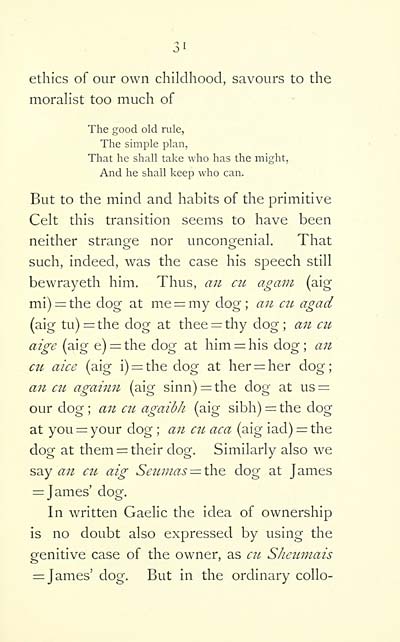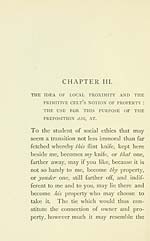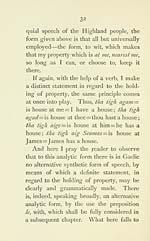Blair Collection > Vestigia celtica
(35)
Download files
Complete book:
Individual page:
Thumbnail gallery: Grid view | List view

ethics of our own childhood, savours to the
morahst too much of
The good old rule,
The simple plan,
That he shall take who has the might.
And he shall keep who can.
But to the mind and habits of the primitive
Celt this transition seems to have been
neither strange nor uncongenial. That
such, indeed, was the case his speech still
bewrayeth him. Thus, an cu again (aig
mi) = the dog at me = my dog ; an cu agad
(aig tu) = the dog at thee = thy dog ; an cu
aige (aig e) = the dog at him ■= his dog ; an
cu aice (aig i) = the dog at her = her dog ;
an en againn (aig sinn) = the dog at us =
our dog ; an cti agaibh (aig sibh) = the dog
at you = your dog ; an cu aca (aig iad) = the
dog at them = their dog. Similarly also we
say «;^ cu aig Seicmas = the dog at James
= James' dog.
In written Gaelic the idea of ownership
is no doubt also expressed by using the
genitive case of the owner, as cu SJicwnais
= James' dog. But in the ordinary collo-
morahst too much of
The good old rule,
The simple plan,
That he shall take who has the might.
And he shall keep who can.
But to the mind and habits of the primitive
Celt this transition seems to have been
neither strange nor uncongenial. That
such, indeed, was the case his speech still
bewrayeth him. Thus, an cu again (aig
mi) = the dog at me = my dog ; an cu agad
(aig tu) = the dog at thee = thy dog ; an cu
aige (aig e) = the dog at him ■= his dog ; an
cu aice (aig i) = the dog at her = her dog ;
an en againn (aig sinn) = the dog at us =
our dog ; an cti agaibh (aig sibh) = the dog
at you = your dog ; an cu aca (aig iad) = the
dog at them = their dog. Similarly also we
say «;^ cu aig Seicmas = the dog at James
= James' dog.
In written Gaelic the idea of ownership
is no doubt also expressed by using the
genitive case of the owner, as cu SJicwnais
= James' dog. But in the ordinary collo-
Set display mode to: Large image | Transcription
Images and transcriptions on this page, including medium image downloads, may be used under the Creative Commons Attribution 4.0 International Licence unless otherwise stated. ![]()
| Early Gaelic Book Collections > Blair Collection > Vestigia celtica > (35) |
|---|
| Permanent URL | https://digital.nls.uk/75800800 |
|---|
| Description | Celtic footprints in philology ethics and religion. |
|---|---|
| Shelfmark | Blair.1 |
| Additional NLS resources: | |
| Attribution and copyright: |
|
| Description | A selection of books from a collection of more than 500 titles, mostly on religious and literary topics. Also includes some material dealing with other Celtic languages and societies. Collection created towards the end of the 19th century by Lady Evelyn Stewart Murray. |
|---|
| Description | Selected items from five 'Special and Named Printed Collections'. Includes books in Gaelic and other Celtic languages, works about the Gaels, their languages, literature, culture and history. |
|---|

